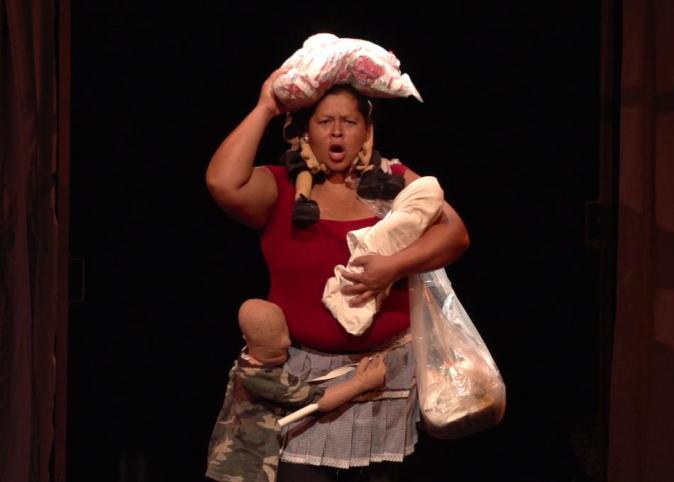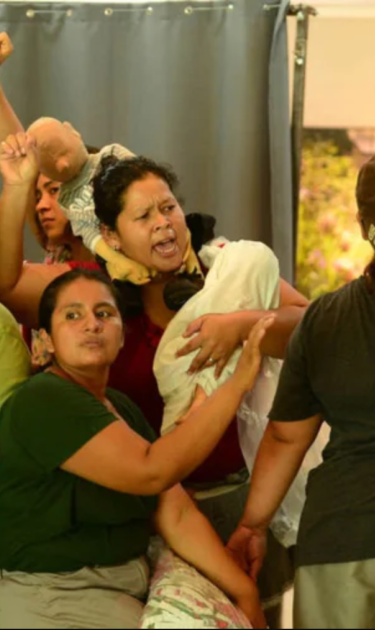The five women featured in Marlén Viñayo’s feature debut, Cachada: The Opportunity, are individuals we rarely see on-screen. They are single mothers and street vendors in El Salvador, making do by selling food or spare items like toilet paper. They are poor, many of them have survived some form of abuse, and they are all just trying to get through the day and support their families. However, in Cachada and in the theater program the documentary follows, they are the stars. The documentary was such a hit among its SXSW viewers that it took home the audience award in the Global category.
In between busy shifts as moms and street sellers, Evelyn Chileno, Magdalena Henríquez, Wendy Henríquez, Magaly Lemus and Ruth H. Vega join their teacher, Egly Larreynaga, in a nondescript room. It looks like the spare activity room of a church, but with the chairs, stray boxes and tables pushed out of the way, leaving behind a blank space – their space – in the room with white walls. The women have formed a theater company, La Cachada Teatro, and it’s in these kinds of nondescript spaces where they first began to do basic acting exercises and stretch creative muscles they may have never known they had.
For these exercises and prompts, the group digs deep to unearth decades, perhaps generations of trauma in their families. They fill the space with their haunting stories of physically abusive parents or sexually abusive partners, men who preyed on them when they were so young, and the frustrations they deal with their kids today. These are not women with the means for therapy. The theater is their form of therapy.
Viñayo plays a one-woman crew, filming on a scrappy digital camera. A good portion of the film is handheld, moving with the women around the room as they work through their stories and feelings. Sometimes, there’s a distance between the camera and a raw performance, as if to give the budding actress space to cry and catch her breath. There’s a sense that everyone in the room is exploring these deep secrets and hidden pain with caution and sensitivity towards each other. Even Egly, the acting coach, checks in with the group and asks them if this is what they feel comfortable exploring. She’s not a therapist and this is beyond her realm of expertise. To her surprise, they ask her to let them continue towards these repressed feelings of anger and hurt. It’s perhaps the first time they’ve ever felt safe enough to talk about these traumas and the first time they may have felt listened to.

For a documentary about so much heartbreak, there is a surprising amount of joy and catharsis. Viñayo follows some of the women home and observes them making their families dinner, playing with their kids and getting them ready for school the next morning. It’s a reminder of what’s at stake for these women. Over the course of the documentary, many of the women open up about physical abuse and how they’ve reexamined hitting their children and decided instead to stop the old practice. If they can set a good example for their kids, they won’t repeat the pain inflicted by the previous generation. During some of the acting exercises, as one woman cries after another, the group rallies around her, either sharing her pain or giving her the floor to keep talking things through. It’s an incredible moment of trust and empathy, and it happens many times over in the course of the movie.
Perhaps the most satisfying moment is one that the film leads up to at the end. The women grow from acting warm-ups to writing sessions and rehearsals. They’re preparing for their biggest challenge yet: performing in front of a large audience with their friends and families in attendance. The audience sees some of the acts in a workshop state, but the finale is all about their feeling of accomplishment, new-found self-esteem, hugging their kids who brought them flowers on stage and taking their messages of empathetic motherhood and breaking abusive cycles to a new audience beyond their neighbors. There are so many others who would benefit from seeing their work.
Cachada: The Opportunity screened at the SXSW Film Festival.




